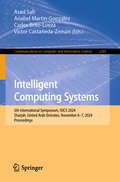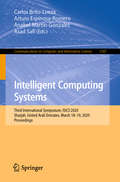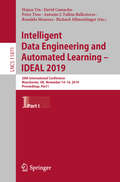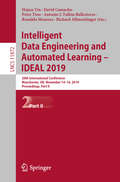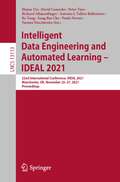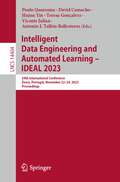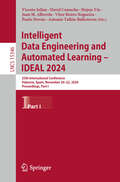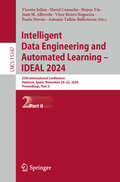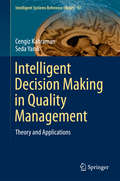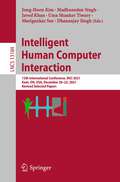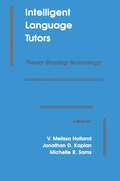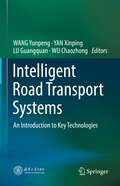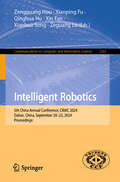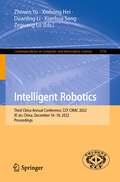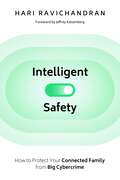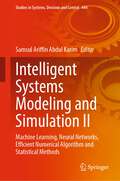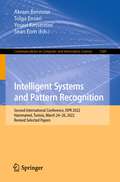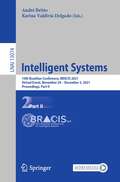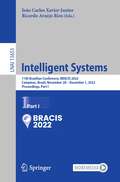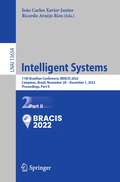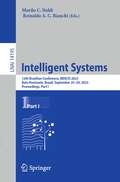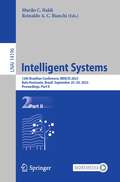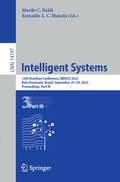- Table View
- List View
Intelligent Computing Systems: 5th International Symposium, ISICS 2024, Sharjah, United Arab Emirates, November 6–7, 2024, Proceedings (Communications in Computer and Information Science #2381)
by Anabel Martin-Gonzalez Carlos Brito-Loeza Asad Safi Victor Castañeda-ZemanThis book constitutes the proceedings of the 5th International Symposium on Intelligent Computing Systems, ISICS 2024, held in Sharjah, United Arab Emirates, during November 6-7, 2024. The 25 full papers included in this book were carefully reviewed and selected from 71 submissions. They focus on research and practice in the fields of artificial intelligence, computer vision, and image processing.
Intelligent Computing Systems: Third International Symposium, ISICS 2020, Sharjah, United Arab Emirates, March 18–19, 2020, Proceedings (Communications in Computer and Information Science #1187)
by Anabel Martin-Gonzalez Carlos Brito-Loeza Arturo Espinosa-Romero Asad SafiThis book constitutes the proceedings of the Third International Symposium on Intelligent Computing Systems, ISICS 2020, held in Sharjah, United Arab Emirates, in March 2020. The 13 full papers presented in this volume were carefully reviewed and selected from 46 submissions. They deal with the field of intelligent computing systems focusing on artificial intelligence, computer vision and image processing.
Intelligent Data Engineering and Automated Learning – IDEAL 2019: 20th International Conference, Manchester, UK, November 14–16, 2019, Proceedings, Part I (Lecture Notes in Computer Science #11871)
by Ronaldo Menezes David Camacho Hujun Yin Antonio J. Tallón-Ballesteros Peter Tino Richard AllmendingerThis two-volume set of LNCS 11871 and 11872 constitutes the thoroughly refereed conference proceedings of the 20th International Conference on Intelligent Data Engineering and Automated Learning, IDEAL 2019, held in Manchester, UK, in November 2019. The 94 full papers presented were carefully reviewed and selected from 149 submissions. These papers provided a timely sample of the latest advances in data engineering and machine learning, from methodologies, frameworks, and algorithms to applications. The core themes of IDEAL 2019 include big data challenges, machine learning, data mining, information retrieval and management, bio-/neuro-informatics, bio-inspired models (including neural networks, evolutionary computation and swarm intelligence), agents and hybrid intelligent systems, real-world applications of intelligent techniques and AI.
Intelligent Data Engineering and Automated Learning – IDEAL 2019: 20th International Conference, Manchester, UK, November 14–16, 2019, Proceedings, Part II (Lecture Notes in Computer Science #11872)
by Ronaldo Menezes David Camacho Hujun Yin Antonio J. Tallón-Ballesteros Peter Tino Richard AllmendingerThis two-volume set of LNCS 11871 and 11872 constitutes the thoroughly refereed conference proceedings of the 20th International Conference on Intelligent Data Engineering and Automated Learning, IDEAL 2019, held in Manchester, UK, in November 2019. The 94 full papers presented were carefully reviewed and selected from 149 submissions. These papers provided a timely sample of the latest advances in data engineering and machine learning, from methodologies, frameworks, and algorithms to applications. The core themes of IDEAL 2019 include big data challenges, machine learning, data mining, information retrieval and management, bio-/neuro-informatics, bio-inspired models (including neural networks, evolutionary computation and swarm intelligence), agents and hybrid intelligent systems, real-world applications of intelligent techniques and AI.
Intelligent Data Engineering and Automated Learning – IDEAL 2021: 22nd International Conference, IDEAL 2021, Manchester, UK, November 25–27, 2021, Proceedings (Lecture Notes in Computer Science #13113)
by Paulo Novais David Camacho Hujun Yin Ke Tang Antonio J. Tallón-Ballesteros Peter Tino Richard Allmendinger Sung-Bae Cho Susana NascimentoThis book constitutes the refereed proceedings of the 22nd International Conference on Intelligent Data Engineering and Automated Learning, IDEAL 2021, which took place during November 25-27, 2021. The conference was originally planned to take place in Manchester, UK, but was held virtually due to the COVID-19 pandemic.The 61 full papers included in this book were carefully reviewed and selected from 85 submissions. They deal with emerging and challenging topics in intelligent data analytics and associated machine learning paradigms and systems. Special sessions were held on clustering for interpretable machine learning; machine learning towards smarter multimodal systems; and computational intelligence for computer vision and image processing.
Intelligent Data Engineering and Automated Learning – IDEAL 2023: 24th International Conference, Évora, Portugal, November 22–24, 2023, Proceedings (Lecture Notes in Computer Science #14404)
by Paulo Quaresma Teresa Gonçalves David Camacho Vicente Julian Hujun Yin Antonio J. Tallón-BallesterosThis book constitutes the proceedings of the 24th International Conference on Intelligent Data Engineering and Automated Learning, IDEAL 2023, held in Évora, Portugal, during November 22–24, 2023.The 45 full papers and 4 short papers presented in this book were carefully reviewed and selected from 77 submissions. IDEAL 2023 is focusing on big data challenges, machine learning, deep learning, data mining, information retrieval and management, bio-/neuro-informatics, bio-inspired models, agents and hybrid intelligent systems, and real-world applications of intelligence techniques and AI.The papers are organized in the following topical sections: main track; special session on federated learning and (pre) aggregation in machine learning; special session on intelligent techniques for real-world applications of renewable energy and green transport; and special session on data selection in machine learning.
Intelligent Data Engineering and Automated Learning – IDEAL 2024: 25th International Conference, Valencia, Spain, November 20–22, 2024, Proceedings, Part I (Lecture Notes in Computer Science #15346)
by Paulo Novais David Camacho Vicente Julian Hujun Yin Juan M. Alberola Vitor Beires Nogueira Antonio Tallón-BallesterosThis two-volume set, LNCS 15346 and LNCS 15347, constitutes the proceedings of the 25th International Conference on Intelligent Data Engineering and Automated Learning, IDEAL 2024, held in Valencia, Spain, during November 20–22, 2024. The 86 full papers and 6 short papers presented in this book were carefully reviewed and selected from 130 submissions. IDEAL 2024 is focusing on Big Data Analytics and Privacy, Machine Learning & Deep Learning for Real-World Applications, Data Mining and Pattern Recognition, Information Retrieval and Management, Bio and Neuro-Informatics, and Hybrid Intelligent Systems and Agents.
Intelligent Data Engineering and Automated Learning – IDEAL 2024: 25th International Conference, Valencia, Spain, November 20–22, 2024, Proceedings, Part II (Lecture Notes in Computer Science #15347)
by Paulo Novais David Camacho Vicente Julian Hujun Yin Juan M. Alberola Vitor Beires Nogueira Antonio Tallón-BallesterosThis two-volume set, LNCS 15346 and LNCS 15347, constitutes the proceedings of the 25th International Conference on Intelligent Data Engineering and Automated Learning, IDEAL 2024, held in Valencia, Spain, during November 20–22, 2024. The 86 full papers and 6 short papers presented in this book were carefully reviewed and selected from 130 submissions. IDEAL 2024 is focusing on Big Data Analytics and Privacy, Machine Learning & Deep Learning for Real-World Applications, Data Mining and Pattern Recognition, Information Retrieval and Management, Bio and Neuro-Informatics, and Hybrid Intelligent Systems and Agents.
Intelligent Decision Making in Quality Management
by Cengiz Kahraman Seda YanıkThis book presents recently developed intelligent techniques with applications and theory in the area of quality management. The involved applications of intelligence include techniques such as fuzzy sets, neural networks, genetic algorithms, etc. The book consists of classical quality management topics dealing with intelligent techniques for solving the complex quality management problems. The book will serve as an excellent reference for quality managers, researchers, lecturers and postgraduate students in this area. The authors of the chapters are well-known researchers in the area of quality management.
Intelligent Disobedience: Doing Right When What You're Told to Do Is Wrong
by Ira ChaleffWhen It's Smart to Say NoNearly every week we read about a tragedy or scandal that could have been prevented if individuals had said no to ill-advised or illegitimate orders. In this timely book, Ira Chaleff explores when and how to disobey inappropriate orders, reduce unacceptable risk, and find better ways to achieve legitimate goals.The inspiration for the book, and its title, comes from the concept of intelligent disobedience used in guide dog training. Guide dogs must recognize and resist a command that would put their human and themselves at risk and identify safer options for achieving the goal. This is precisely what Chaleff helps humans do. Using both deeply disturbing and uplifting examples, as well as critical but largely forgotten research, he shows how to create a culture where, rather than "just following orders," people hold themselves accountable to do the right thing, always.
Intelligent Human Computer Interaction: 13th International Conference, IHCI 2021, Kent, OH, USA, December 20–22, 2021, Revised Selected Papers (Lecture Notes in Computer Science #13184)
by Madhusudan Singh Uma Shanker Tiwary Dhananjay Singh Jong-Hoon Kim Javed Khan Marigankar SurThis volume constitutes the refereed proceedings of the 13th International Conference on Intelligent Human Computer Interaction, IHCI 2021, which took place in Kent, OH, USA, in December 2021. The 59 full and 9 short papers included in these proceedings were carefully reviewed and selected from a total of 142 submissions. The papers were organized in topical sections named human centered AI; and intelligent interaction and cognitive computing
Intelligent Language Tutors: Theory Shaping Technology
by V. Melissa Holland Jonathan D. Kaplan Michelle R. SamsThe techniques of natural language processing (NLP) have been widely applied in machine translation and automated message understanding, but have only recently been utilized in second language teaching. This book offers both an argument for and a critical examination of this new application, with an examination of how systems may be designed to exploit the power of NLP, accomodate its limitations, and minimize its risks. This volume marks the first collection of work in the U.S. and Canada that incorporates advanced human language technologies into language tutoring systems, covering languages as diverse as Arabic, Spanish, Japanese, and English. The book is organized into sections that express the levels of analysis dealt with in learning and teaching a language and with the tasks of the student as writer, reader, conversant, and actor in the world. These sections bring together research by specialists in linguistics, artificial intelligence, psychology, instructional design, and language teaching. In addition to providing detailed descriptions of working systems, amply illustrated with screens from lesson and authoring interfaces, the contributors address a spectrum of common issues: * What can current NLP technology contribute to computer-assisted language instruction and to research on language learning? * How can this technology meet the demands of pedagogical theory for communicative language teaching in authentic contexts? * How can designers constrain tutoring environments to ensure accurate analysis of learners' language? * What can NLP-based systems teach us about language acquisition, about linguistic theory, and about theories of language pedagogy? * What lessons have been learned in using these systems to date? Discipline-specific issues are illuminated as well: the relative merits of the major syntactic frameworks for NLP-based language tutoring; the adaptation of theories like lexical conceptual structure to support semantic interpretation; the integration of input language with visual microworlds and dialogue games; the pragmatics of the tutoring discourse; the selection of instructional principles to guide system design; and the accomodation of design to individual differences and learner styles. A concluding section assesses this work from larger theoretical and practical perspectives -- experimental psychology and psycholinguistics, linguistics, language teaching, and second language acquisition research.
Intelligent Music Teaching: Essays on the Core Principles of Effective Instruction
by Robert A. DukeIn this collection of insightful essays, the author describes fundamental principles of human learning in the context of teaching music. Written in an engaging, conversational style, the individual essays outline the elements of intelligent, creative teaching. Duke effectively explains how teachers can meet the needs of individual students from a wide range of abilities by understanding more deeply how people learn. Teachers and interested parents alike will benefit from this informative and highly readable book.
Intelligent Road Transport Systems: An Introduction to Key Technologies
by Wang Yunpeng Yan Xinping Lu Guangquan Wu ChaozhongIn recent years, the application of intelligent transportation systems (ITS) has steadily expanded, and has become a hot spot of common interest to universities, scientific research institutes, enterprises and institutions in the transportation field. ITS is the product of the deep integration of modern high-tech in the transportation industry, and its development has accompanied that of modern high-tech. ITS is now also becoming part of the Internet of Things (IoT), and is expected to contribute significantly to making our cities smarter and connecting with other infrastructure. Although there are many monographs and textbooks on intelligent transportation, with the advancement of technology and changes in demand, the key technologies of ITS are also rapidly changing.This book chiefly focuses on the main technologies of ITS, examining them from four perspectives: “sense” (perception and management of traffic information, chapters 2 & 3), “transmission” (interaction of traffic information, chapter 4), “prediction” (prediction of traffic states, chapter 6) and “application” (intelligent transportation applications, chapters 6 through 10). Given its scope, the book can be used as a textbook for undergraduates or graduates, as well as a reference book for research institutes and enterprises.This book emphasizes the use of basis traffic engineering principles and state-of-art methodologies to develop functional designs. It largely reflects the authors’ own experience in adapting these methodologies to ITS design. For example, the book addresses various forms of data collection, models used to predict and evaluate traffic states, comprehensive description in connected vehicles, applications for users and traffic managers, etc. The knowledge gained here will allow designers to estimate the performance differences among alternatives and gauge their potential benefits for functional design purposes. To gain the most from the book, readers should be somewhat familiar with the field of traffic engineering and interested in ITS.
Intelligent Robotics: 5th China Annual Conference, CIRAC 2024, Dalian, China, September 20–22, 2024, Proceedings (Communications in Computer and Information Science #2355)
by Xianhua Song Zeguang Lu Qinghua Hu Xin Fan Zengguang Hou Xianping FuThis book constitutes selected papers presented during the 5th China Annual Intelligent Robotics Conference, CIRAC 2024, held in Dalian, China, in September 2024. The 28 full papers presented in this volume were carefully reviewed and selected from 96 submissions. They are grouped into the following topics: Deep Learning Architecture; Low-Level Vision; Multi-modal learning; Pattern Recognition; Robotics; and Signal processing.
Intelligent Robotics: Third China Annual Conference, CCF CIRAC 2022, Xi’an, China, December 16–18, 2022, Proceedings (Communications in Computer and Information Science #1770)
by Xianhua Song Zeguang Lu Zhiwen Yu Xinhong Hei Duanling LiThis book constitutes selected papers presented during the Third China Annual Intelligent Robotics Conference, CCF CIRAC 2022, held in Xi' an, China, in December 2022. The 35 papers presented were thoroughly reviewed and selected from the 120 qualified submissions. They are organized in the following topical sections: robot safety; intelligent robot sensing; autonomous robot navigation; artificial intelligence and cloud robot; unmanned cluster collaboration; natural human-computer interaction; other robot-related technologies.
Intelligent Safety: How to Protect Your Connected Family from Big Cybercrime
by Hari RavichandranTurn the tables on cybercriminals. Keep your loved ones safe. We live much of our personal and professional lives online, but fraudsters and hackers have made the internet dangerous. Cyberattacks are the US&’s fastest growing crime: consumers lost more than $6.9 billion to fraud in 2021, up more than 50% from 2020; financial losses from online theft surpassed losses from home theft; 1 in 10 people become identity theft victims annually, including more than 1 million children. So how do we keep our kids, parents, colleagues, and selves safe against organized cybercriminals with their increasingly advanced tools?Intelligent Safety: How to Protect Your Connected Family from Big Cybercrime teaches how we can put our families&’ online safety on autopilot and regain our peace of mind. It provides families with the tools and knowledge they need to create a personalized, proactive defense against cybercriminals. From identifying the risks of your teen&’s secret online life to safeguarding your family finances to defending the vulnerabilities of your aging parents, Intelligent Safety is the last guide you&’ll need to beat cyber predators at their own game.
Intelligent Systems Modeling and Simulation II: Machine Learning, Neural Networks, Efficient Numerical Algorithm and Statistical Methods (Studies in Systems, Decision and Control #444)
by Samsul Ariffin Abdul KarimThis book develops a new system of modeling and simulations based on intelligence system. As we are directly moving from Third Industrial Revolution (IR3.0) to Fourth Industrial Revolution (IR4.0), there are many emergence techniques and algorithm that appear in many sciences and engineering branches. Nowadays, most industries are using IR4.0 in their product development as well as to refine their products. These include simulation on oil rig drilling, big data analytics on consumer analytics, fastest algorithm for large-scale numerical simulations and many more. These will save millions of dollar in the operating costs. Without any doubt, mathematics, statistics and computing are well blended to form an intelligent system for simulation and modeling. Motivated by this rapid development, in this book, a total of 41 chapters are contributed by the respective experts. The main scope of the book is to develop a new system of modeling and simulations based on machine learning, neural networks, efficient numerical algorithm and statistical methods. This book is highly suitable for postgraduate students, researchers as well as scientists that have interest in intelligent numerical modeling and simulations.
Intelligent Systems and Pattern Recognition: Second International Conference, ISPR 2022, Hammamet, Tunisia, March 24–26, 2022, Revised Selected Papers (Communications in Computer and Information Science #1589)
by Yousri Kessentini Akram Bennour Tolga Ensari Sean EomThis volume constitutes selected papers presented during the Second International Conference on Intelligent Systems and Pattern Recognition, ISPR 2022, held in Hammamet, Tunisia, in March 2022. Due to the COVID-19 pandemic the conference was held online. The 22 full papers and 10 short papers presented were thoroughly reviewed and selected from the 91 submissions. The papers are organized in the following topical sections: computer vision; data mining; pattern recognition; machine and deep learning.
Intelligent Systems: 10th Brazilian Conference, BRACIS 2021, Virtual Event, November 29 – December 3, 2021, Proceedings, Part II (Lecture Notes in Computer Science #13074)
by André Britto Karina Valdivia DelgadoThe two-volume set LNAI 13073 and 13074 constitutes the proceedings of the 10th Brazilian Conference on Intelligent Systems, BRACIS 2021, held in São Paolo, Brazil, in November-December 2021. The total of 77 papers presented in these two volumes was carefully reviewed and selected from 192 submissions.The contributions are organized in the following topical sections: Part I: Agent and Multi-Agent Systems, Planning and Reinforcement Learning; Evolutionary Computation, Metaheuristics, Constrains and Search, Combinatorial and Numerical Optimization, Knowledge Representation, Logic and Fuzzy Systems; Machine Learning and Data Mining. Part II: Multidisciplinary Artificial and Computational Intelligence and Applications; Neural Networks, Deep Learning and Computer Vision; Text Mining and Natural Language Processing. Due to the COVID-2019 pandemic, BRACIS 2021 was held as a virtual event.
Intelligent Systems: 11th Brazilian Conference, BRACIS 2022, Campinas, Brazil, November 28 – December 1, 2022, Proceedings, Part I (Lecture Notes in Computer Science #13653)
by João Carlos Xavier-Junior Ricardo Araújo RiosThe two-volume set LNAI 13653 and 13654 constitutes the refereed proceedings of the 11th Brazilian Conference on Intelligent Systems, BRACIS 2022, which took place in Campinas, Brazil, in November/December 2022. The 89 papers presented in the proceedings were carefully reviewed and selected from 225 submissions. The conference deals with theoretical aspects and applications of artificial and computational intelligence.
Intelligent Systems: 11th Brazilian Conference, BRACIS 2022, Campinas, Brazil, November 28 – December 1, 2022, Proceedings, Part II (Lecture Notes in Computer Science #13654)
by João Carlos Xavier-Junior Ricardo Araújo RiosThe two-volume set LNAI 13653 and 13654 constitutes the refereed proceedings of the 11th Brazilian Conference on Intelligent Systems, BRACIS 2022, which took place in Campinas, Brazil, in November/December 2022. The 89 papers presented in the proceedings were carefully reviewed and selected from 225 submissions. The conference deals with theoretical aspects and applications of artificial and computational intelligence.
Intelligent Systems: 12th Brazilian Conference, BRACIS 2023, Belo Horizonte, Brazil, September 25–29, 2023, Proceedings, Part I (Lecture Notes in Computer Science #14195)
by Reinaldo A. C. Bianchi Murilo C. NaldiThe three-volume set LNAI 14195, 14196, and 14197 constitutes the refereed proceedings of the 12th Brazilian Conference on Intelligent Systems, BRACIS 2023, which took place in Belo Horizonte, Brazil, in September 2023. The 90 full papers included in the proceedings were carefully reviewed and selected from 242 submissions. They have been organized in topical sections as follows:Part I: Best papers; resource allocation and planning; rules and feature extraction; AI and education; agent systems; explainability; AI models; Part II: Transformer applications; convolutional neural networks; deep learning applications; reinforcement learning and GAN; classification; machine learning analysis;Part III: Evolutionary algorithms; optimization strategies; computer vision; language and models; graph neural networks; pattern recognition; AI applications.
Intelligent Systems: 12th Brazilian Conference, BRACIS 2023, Belo Horizonte, Brazil, September 25–29, 2023, Proceedings, Part II (Lecture Notes in Computer Science #14196)
by Reinaldo A. C. Bianchi Murilo C. NaldiThe three-volume set LNAI 14195, 14196, and 14197 constitutes the refereed proceedings of the 12th Brazilian Conference on Intelligent Systems, BRACIS 2023, which took place in Belo Horizonte, Brazil, in September 2023. The 90 full papers included in the proceedings were carefully reviewed and selected from 242 submissions. They have been organized in topical sections as follows:Part I: Best papers; resource allocation and planning; rules and feature extraction; AI and education; agent systems; explainability; AI models; Part II: Transformer applications; convolutional neural networks; deep learning applications; reinforcement learning and GAN; classification; machine learning analysis;Part III: Evolutionary algorithms; optimization strategies; computer vision; language and models; graph neural networks; pattern recognition; AI applications.
Intelligent Systems: 12th Brazilian Conference, BRACIS 2023, Belo Horizonte, Brazil, September 25–29, 2023, Proceedings, Part III (Lecture Notes in Computer Science #14197)
by Reinaldo A. C. Bianchi Murilo C. NaldiThe three-volume set LNAI 14195, 14196, and 14197 constitutes the refereed proceedings of the 12th Brazilian Conference on Intelligent Systems, BRACIS 2023, which took place in Belo Horizonte, Brazil, in September 2023. The 90 full papers included in the proceedings were carefully reviewed and selected from 242 submissions. They have been organized in topical sections as follows:Part I: Best papers; resource allocation and planning; rules and feature extraction; AI and education; agent systems; explainability; AI models; Part II: Transformer applications; convolutional neural networks; deep learning applications; reinforcement learning and GAN; classification; machine learning analysis;Part III: Evolutionary algorithms; optimization strategies; computer vision; language and models; graph neural networks; pattern recognition; AI applications.
